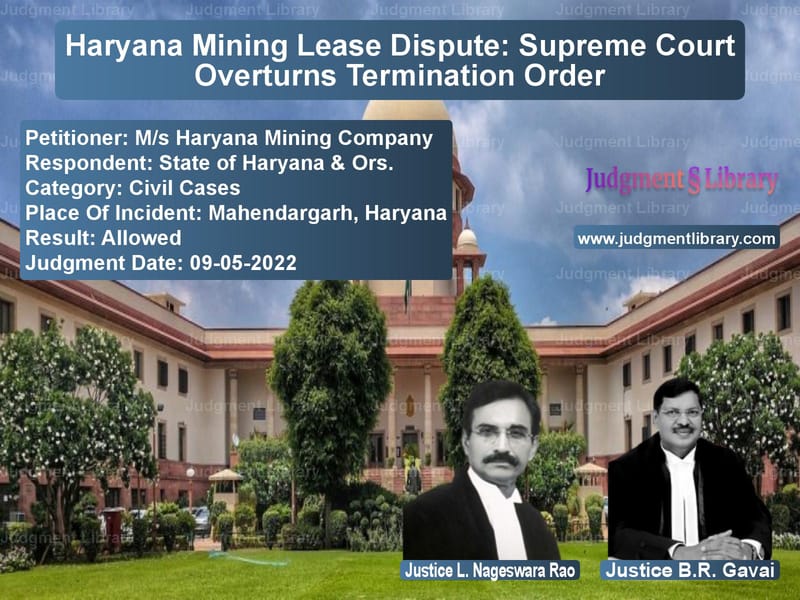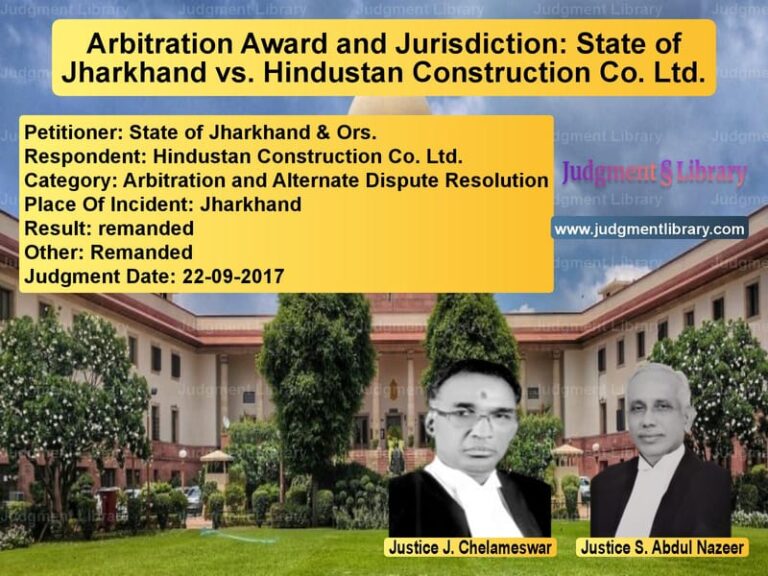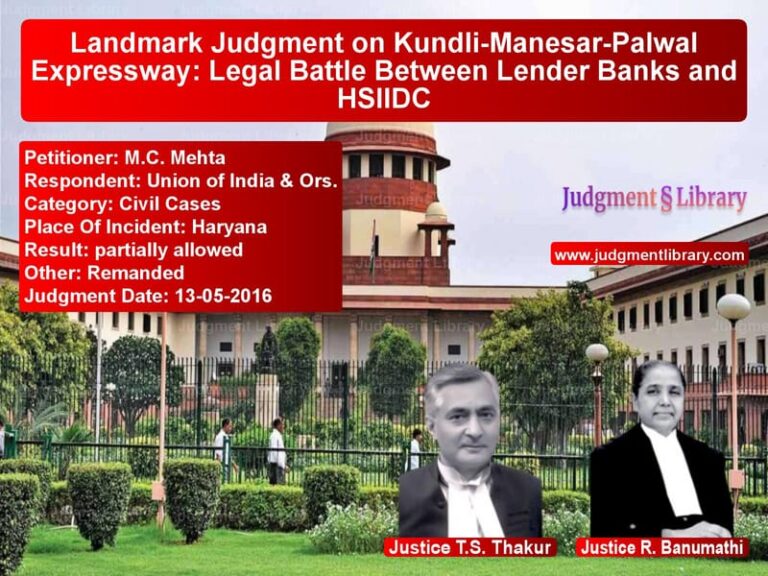Haryana Mining Lease Dispute: Supreme Court Overturns Termination Order
The Supreme Court of India recently ruled on a critical dispute involving the termination of a mining lease granted to M/s Haryana Mining Company by the State of Haryana. The case revolved around allegations of illegal mining, an appeal against the lease termination, and the principles of judicial review in such matters. The judgment provides significant insights into procedural fairness, evidence evaluation, and the rights of lessees in mining contracts.
Background of the Case
M/s Haryana Mining Company was granted a mining lease for extracting stone and associated minor minerals in an area of 6.70 hectares in Mahendargarh district. The lease was executed on April 11, 2016, and the company began operations on June 15, 2016, after proper demarcation of the mining area. However, concerns regarding illegal mining led to multiple complaints, triggering inspections and inquiries.
Complaints were received from the Sarpanch of Village Khudana, who alleged illegal mining beyond the allocated area. Subsequently, a detailed inquiry was conducted by the Additional Deputy Commissioner, resulting in a report on February 25, 2019. The report suggested that illegal mining had taken place in the Aravali Forest area (Khasra Nos. 366-367), but the perpetrator could not be identified.
Key Issues Before the Supreme Court
- Whether the termination of the mining lease was justified in the absence of concrete evidence of illegal mining by M/s Haryana Mining Company.
- Whether due process was followed before terminating the lease.
- Whether the decision of the Punjab and Haryana High Court upholding the termination order was correct.
- The role of judicial review in cases where administrative decisions are challenged.
Arguments Presented
Petitioner’s (M/s Haryana Mining Company) Arguments
- The petitioner argued that there was no conclusive evidence linking them to illegal mining outside the leased area.
- The inquiry reports, particularly the ADC Report, failed to establish their involvement in unauthorized excavation.
- The mining lease was terminated without proper application of mind and in violation of principles of natural justice.
- The Divisional Forest Officer (DFO) had conducted an independent investigation and concluded that there was no illegal mining by the petitioner.
- The appellate authority and the High Court failed to consider the lack of direct evidence before upholding the termination order.
Respondent’s (State of Haryana) Arguments
- The state government contended that multiple complaints had been received from villagers, substantiating the allegations of illegal mining.
- The Mining Officer’s report of February 4, 2019, supported the claim that illegal mining had taken place in an area adjacent to the petitioner’s lease.
- The government argued that M/s Haryana Mining Company was the only active operator in the vicinity during the period when illegal mining was reported.
- They maintained that the termination order was issued after giving the petitioner sufficient opportunity to respond.
Supreme Court’s Observations and Ruling
1. Lack of Conclusive Evidence
The Supreme Court emphasized that the reports cited in the termination order failed to directly implicate M/s Haryana Mining Company. It was noted that the ADC Report did not establish who was responsible for the illegal mining.
2. Procedural Irregularities
The Court found that the termination order relied on assumptions rather than solid evidence. The Divisional Forest Officer’s report of October 15, 2019, which cleared the petitioner of wrongdoing, was completely ignored in the termination proceedings.
3. Importance of Judicial Review
Referring to past precedents, the Court stated that administrative actions must be based on reasonable grounds. In this case, the termination order lacked a substantial basis and violated the principles of fairness and due process.
4. Arbitrary Decision-Making
The Court ruled that the state’s decision to terminate the lease was arbitrary and unreasonable, as it failed to consider material evidence favoring the petitioner.
Impact of the Judgment
The Supreme Court’s ruling in favor of M/s Haryana Mining Company has significant implications for the mining industry and administrative decision-making:
1. Strengthening Fairness in Lease Cancellations
The judgment reinforces the requirement that lease terminations must be backed by strong, verifiable evidence rather than circumstantial assumptions.
2. Protecting Businesses from Unwarranted Government Actions
The ruling serves as a safeguard against arbitrary state actions that could impact businesses without sufficient cause.
3. Clarification on Judicial Review in Mining Disputes
The judgment highlights the importance of judicial intervention in cases where state authorities fail to adhere to principles of procedural justice.
Conclusion
The Supreme Court’s decision in M/s Haryana Mining Company vs. State of Haryana is a landmark ruling in Indian mining law. By overturning the termination order, the Court has reaffirmed the importance of evidence-based decision-making and procedural fairness. This ruling will serve as an important precedent in similar disputes where administrative actions are challenged on the grounds of arbitrariness.
Petitioner Name: M/s Haryana Mining Company.Respondent Name: State of Haryana & Ors..Judgment By: Justice L. Nageswara Rao, Justice B.R. Gavai.Place Of Incident: Mahendargarh, Haryana.Judgment Date: 09-05-2022.
Don’t miss out on the full details! Download the complete judgment in PDF format below and gain valuable insights instantly!
Download Judgment: ms-haryana-mining-c-vs-state-of-haryana-&-o-supreme-court-of-india-judgment-dated-09-05-2022.pdf
Directly Download Judgment: Directly download this Judgment
See all petitions in Contract Disputes
See all petitions in Property Disputes
See all petitions in Landlord-Tenant Disputes
See all petitions in Specific Performance
See all petitions in Damages and Compensation
See all petitions in Judgment by L. Nageswara Rao
See all petitions in Judgment by B R Gavai
See all petitions in allowed
See all petitions in supreme court of India judgments May 2022
See all petitions in 2022 judgments
See all posts in Civil Cases Category
See all allowed petitions in Civil Cases Category
See all Dismissed petitions in Civil Cases Category
See all partially allowed petitions in Civil Cases Category







